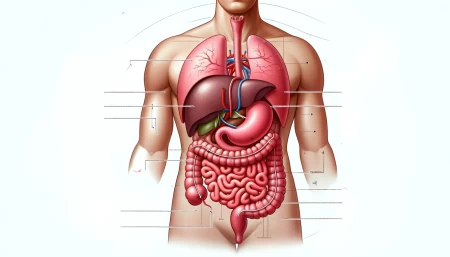Imagine your favorite meal, sizzling and ready to be enjoyed. But what happens after you take that first bite? That’s where chemical digestion steps in, the process your body undertakes to turn food into fuel. This journey, often overlooked, is essential for your health and well-being.
We’ll dive into the mechanics of chemical digestion, exploring how your body breaks down complex food substances into simpler forms your cells can use. From enzymes to acids, we’ll uncover the roles different components play in this vital process. Get ready to unlock how your body breaks down every bite of food, and understand why chemical digestion is key to revealing the energy your body needs.
Key Takeaways
- Chemical digestion is essential for transforming complex food molecules into absorbable nutrients, facilitating energy production and overall health. It involves a series of enzymatic and acidic reactions that breakdown proteins, fats, and carbohydrates.
- Enzymes play a critical role in chemical digestion, with specific types like amylase, pepsin, and lipase working in different parts of the digestive system to optimize the breakdown of food into usable nutrients.
- Acidity levels within the stomach and small intestine are crucial for digestion, with stomach acids initiating protein digestion and bicarbonate from the pancreas neutralizing acids for further digestive processes in the small intestine.
- The absorption of nutrients by cells is a vital phase post-chemical digestion, depending on factors like surface area, transport mechanisms, and interactions with gut microbiota to efficiently take up nutrients into the bloodstream.
- A balanced diet rich in natural enzymes, probiotics, fiber, and hydration supports efficient chemical digestion and nutrient absorption, contributing to optimal gut health and overall well-being.
- Understanding the mechanisms of chemical digestion empowers individuals to make informed dietary choices, emphasizing the importance of gut health for energy production and a healthy lifestyle.
Understanding Chemical Digestion
At the heart of chemical digestion lie enzymes and acids, each with a specific function geared towards optimizing the breakdown of food. These biological catalysts accelerate chemical reactions within the digestive system, ensuring that nutrients like proteins, fats, and carbohydrates are adequately processed. For instance, amylase, an enzyme found in saliva, kicks off the digestion of carbohydrates right from the moment you take your first bite.
Beyond the mouth, the stomach and small intestine play critical roles in furthering this process. The stomach, with its acidic environment, is designed for protein breakdown, whereas the small intestine, with its neutral pH, focuses on fats and the remaining carbohydrates. It’s here that bile salts, produced by your liver and stored in the gallbladder, emulsify fats, making them easier for digestive enzymes to work on.
| Substance | Role in Chemical Digestion |
|---|---|
| Amylase | Breaks down carbohydrates |
| Stomach Acids | Initiates protein digestion |
| Bile Salts | Emulsify fats |
Understanding the vital role of enzymes and acids will shed light on the importance of maintaining a balanced diet and a healthy digestive system. Foods rich in natural enzymes, like pineapples and papayas, can support your digestive process, while probiotic-rich foods like yogurt can help maintain the balance of beneficial bacteria in your gut.
Enzymes To Break Down Food

When it comes to nourishing your body and facilitating the transformations food undergoes from ingestion to digestion, enzymes play a pivotal role. These biological catalysts speed up chemical reactions in your body, making it possible to efficiently break down food into nutrients that your body can use.
Enzymes are specialized proteins that target specific types of molecules. For example, amylase in your saliva kicks off the digestion process by breaking down carbohydrates into simple sugars while you’re still chewing. Here’s a look at how different enzymes work in various parts of the digestive system:
- In the Mouth: Amylase initiates the breakdown of carbohydrates.
- In the Stomach: Pepsin, aided by stomach acid, starts protein digestion.
- In the Small Intestine: Pancreatic enzymes like lipase, protease, and amylase further breakdown fats, proteins, and carbohydrates. Bile salts from the liver also play a crucial role in emulsifying fats, making them easier for lipase to act on.
Each enzyme has an optimal pH and temperature where it works best, which your body meticulously maintains. This is why maintaining a balanced diet and ensuring proper functioning of your digestive system is key to optimal health.
Including foods rich in natural enzymes, such as pineapples and papayas, in your diet can support your digestive processes. Besides, incorporating probiotics from yogurt or fermented foods can help sustain the health of your gut microbiome, aiding in the breakdown and absorption of nutrients.
Acids in the Digestive Process
Your stomach secretes acid known as hydrochloric acid (HCl) – which not only breaks down food particles but also kills bacteria and pathogens that enter your stomach, ensuring your digestive process is as smooth and safe as possible.
Hydrochloric Acid (HCl), alongside enzyme pepsin, begins the process of digesting proteins into smaller units, called peptides. This complex process underscores the importance of maintaining optimal levels of stomach acid. A common misconception is that high stomach acid levels cause discomfort, but in many cases, the opposite is true. Low levels of HCl can lead to various digestive problems, including bloating, gas, and poor nutrient absorption.
To support healthy levels of stomach acid and help effective digestion, consider incorporating foods like:
- Lean (non-conventional) meats
- Leafy greens
- Fermented vegetables
These food choices not only support the production of HCl but are also integral to your journey toward a more nourished and transformed digestive health.
Moving down the digestive tract, another critical player comes into the spotlight: bicarbonate. Produced by the pancreas, bicarbonate neutralizes the stomach acid once it enters the small intestine, creating an environment conducive to the action of digestive enzymes.
This balance between acidity and alkalinity is needed for the digestion and absorption of nutrients. A disruption in this balance can lead to discomfort and inefficiencies in nutrient extraction, emphasizing the importance of a balanced diet and, if necessary, targeted nutritional supplements to maintain optimal digestive health.
Remember, the acids in your digestive system are much more than simple chemical compounds. They are the unsung heroes of your gut, working tirelessly to break down your meals into the nutrients that fuel your body. Keeping them balanced is vital to achieving a state of overall well-being and optimal gut health.
Absorption of Nutrients by Cells
Following the breakdown of food through chemical digestion, the next vital phase your body embarks on is the absorption of nutrients by cells. This step is where the real magic happens—transforming what you eat into fuel and building blocks your body needs for energy, growth, and repair.
At the forefront of this nourishing transformation are the small intestine’s lining cells, which is responsible for nutrient uptake. As digested food particles pass through, nutrients such as amino acids, fatty acids, and simple sugars are absorbed through the intestinal walls into the bloodstream. This process not only sustains your body’s energy levels but also fuels cellular activities essential for daily functioning.
Key Factors in Nutrient Absorption:
- Surface Area: The small intestine’s extensive surface area, amplified by villi and microvilli, dramatically increases the capacity for nutrient absorption.
- Transport Mechanisms: Specific nutrients require distinct transport methods to cross cell membranes, including passive diffusion, facilitated diffusion, active transport, and endocytosis.
- Interactions with Microbiota: Your gut microbiome plays a crucial role in breaking down complex substances, enhancing nutrient availability and absorption.
For optimal absorption, maintaining gut health is imperative. The balance of gut flora, integrity of the gut lining, and a diet rich in fiber, vitamins, and minerals all contribute to maximizing nutrient uptake from your diet.
Incorporating a variety of whole foods, hydration, and regular physical activity can promote efficient digestion and nutrient absorption. Paying attention to food combinations—such as pairing vitamin C-rich foods with iron sources—can also enhance the bioavailability of certain nutrients.
- Consume a balanced, nutrient-dense diet.
- Stay hydrated to assist in the digestive process.
- Engage in physical activities that support gut motility.
- Consider probiotics or prebiotics to support a healthy gut microbiota.
Importance of Chemical Digestion for Energy Production
When diving into the role of chemical digestion, energy production emerges as a foundational pillar. Your body’s ability to convert food into the fuel it needs hinges on this critical process. Chemical digestion, taking place predominantly in the stomach and small intestine, breaks down complex molecules like proteins, fats, and carbohydrates into smaller, more absorbable units. This transformation is not just necessary; it’s essential for sustaining life’s energy demands.
Proteins, broken down into amino acids; fats into fatty acids and glycerol; and carbohydrates into simple sugars like glucose, represent the end products of digestive efforts. These nutrients, once broken down, can easily cross the intestinal wall and enter your bloodstream, becoming available for your cells to use. Glucose, in particular, is important for energy production as the primary fuel source for your cells, especially those in your brain and muscles.
The process of chemical digestion is supported by various enzymes and acids produced by your body. For example, amylase in saliva starts the breakdown of carbohydrates, while pepsin in the stomach tackles proteins. This enzymatic orchestration ensures that nutrients are converted efficiently and effectively, emphasizing the importance of a functioning digestive system for optimal energy levels.
Incorporating a balanced nutrient-dense diet with complex carbohydrates, lean proteins, and healthy fats supports the chemical digestion process. Hydration plays an important role as well, as sufficient fluid intake facilitates the smooth passage of digested food through your intestines, making nutrient absorption more effective.
Remember, the journey foods undergo from your plate to becoming usable energy for your body involves a complex series of steps, with chemical digestion at the heart. Prioritizing gut health through mindful eating and understanding the mechanics behind chemical digestion can empower you to maximize your body’s energy production capabilities.
Conclusion
Understanding the intricate process of chemical digestion unlocks the secret to optimizing your energy levels. By ensuring your diet supports the breakdown of essential nutrients into their building blocks, you’re not just eating; you’re fueling your body’s energy production engine. Remember, every bite you take is a step towards a more energized and vibrant you. So, cherish your digestive system’s role and make choices that enhance its function. After all, a well-nourished body is the foundation of a healthy, energetic life.


